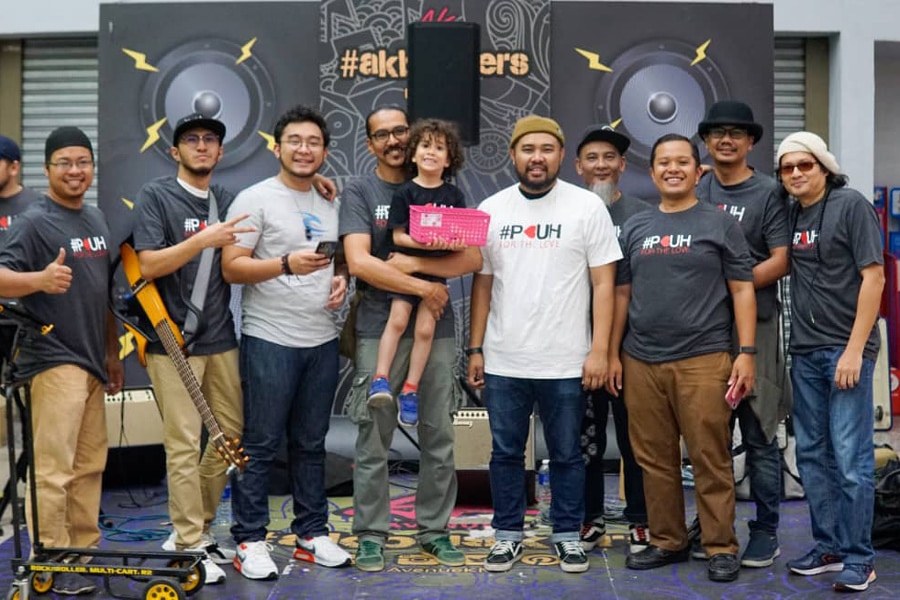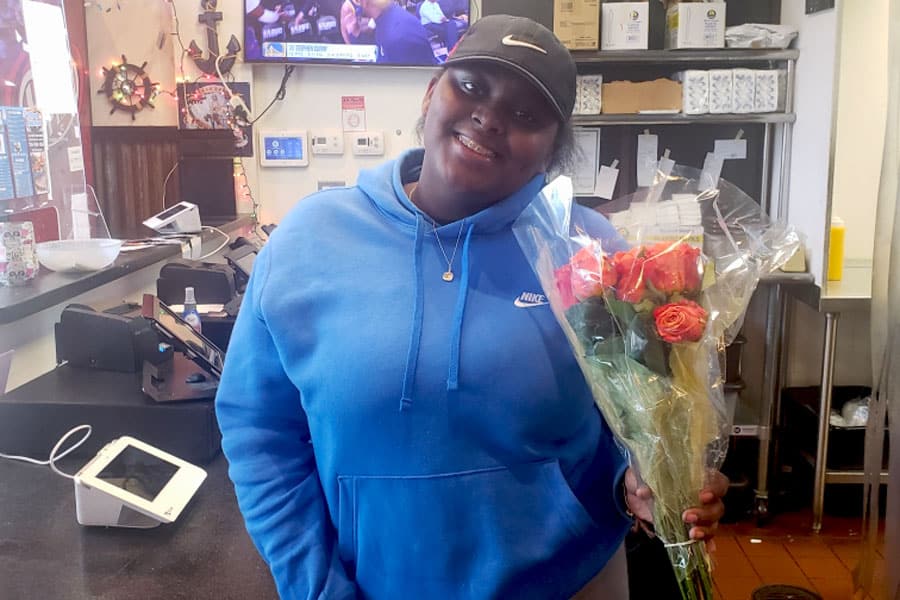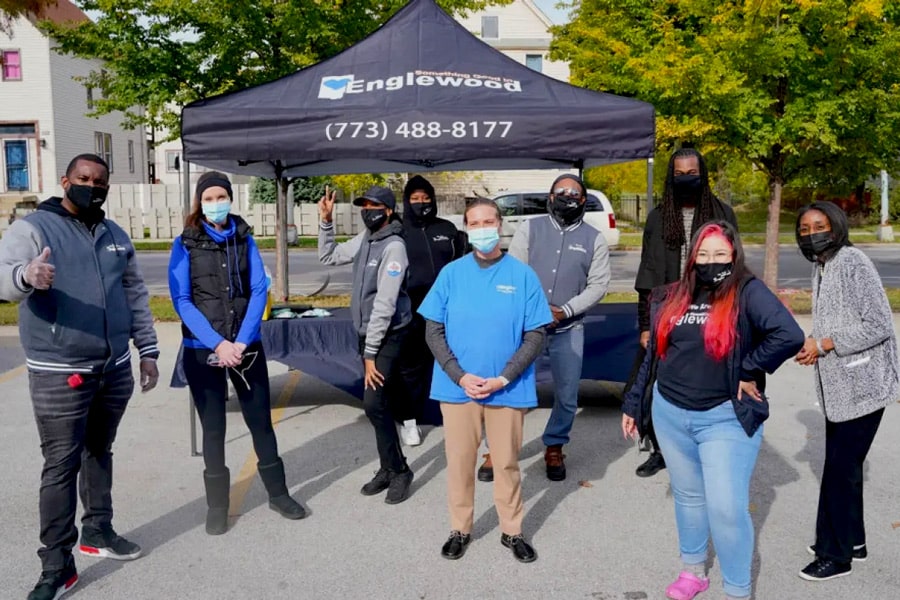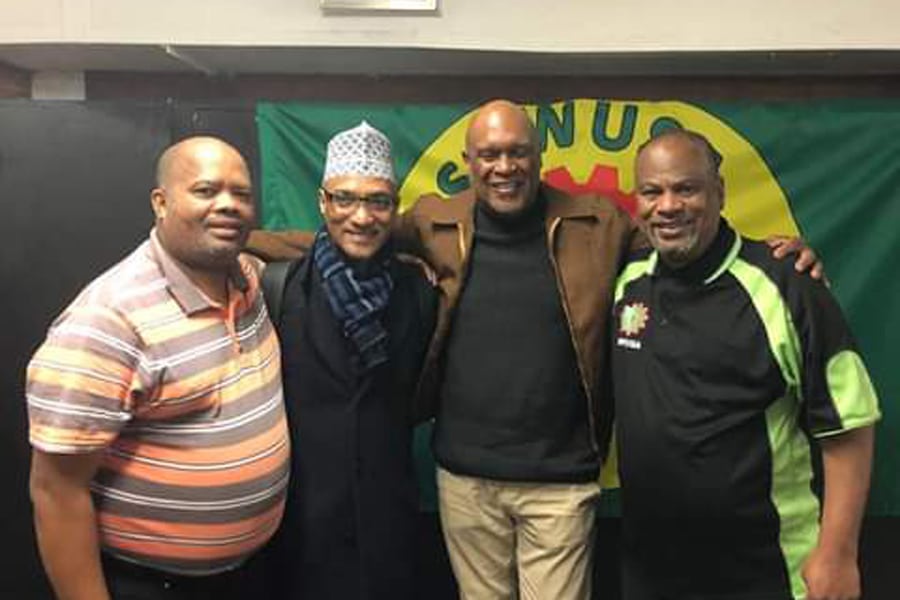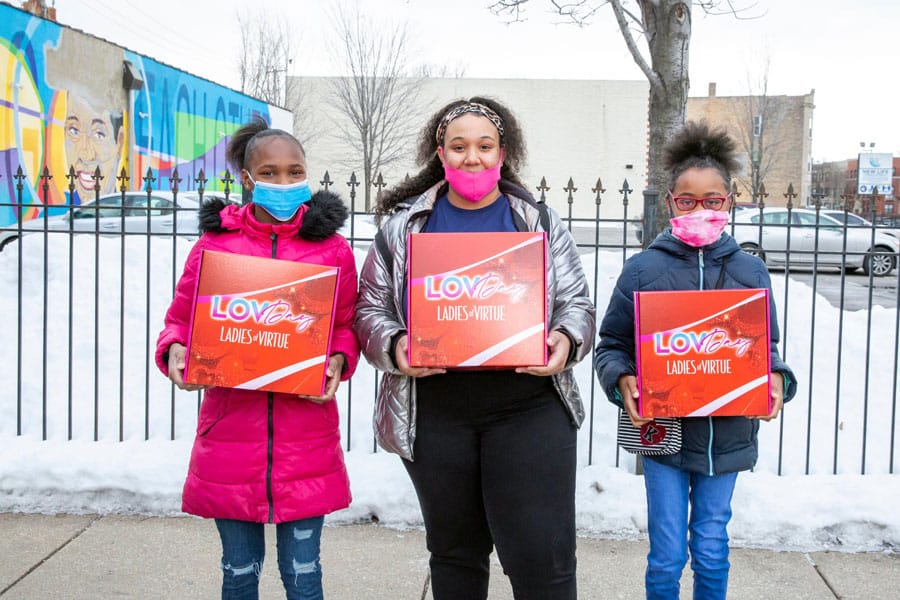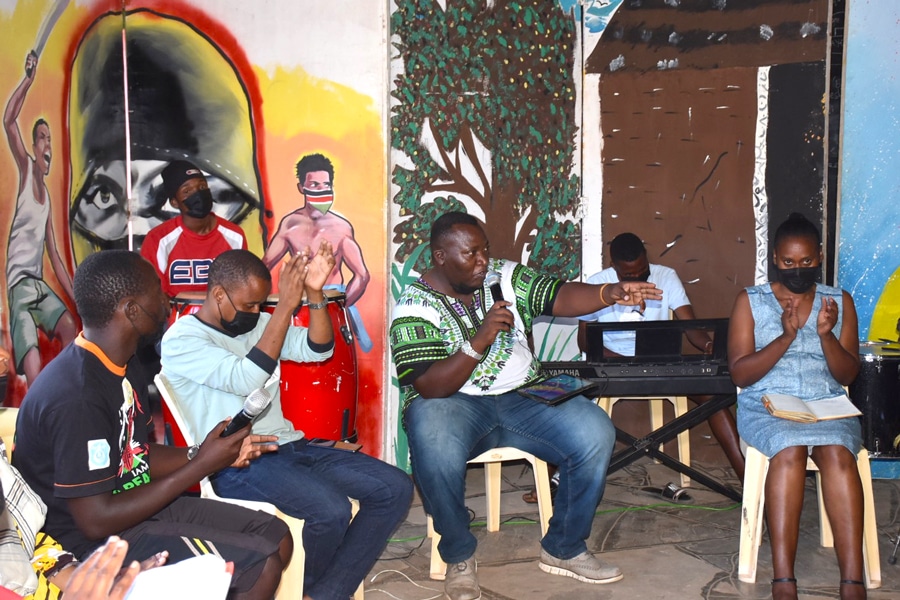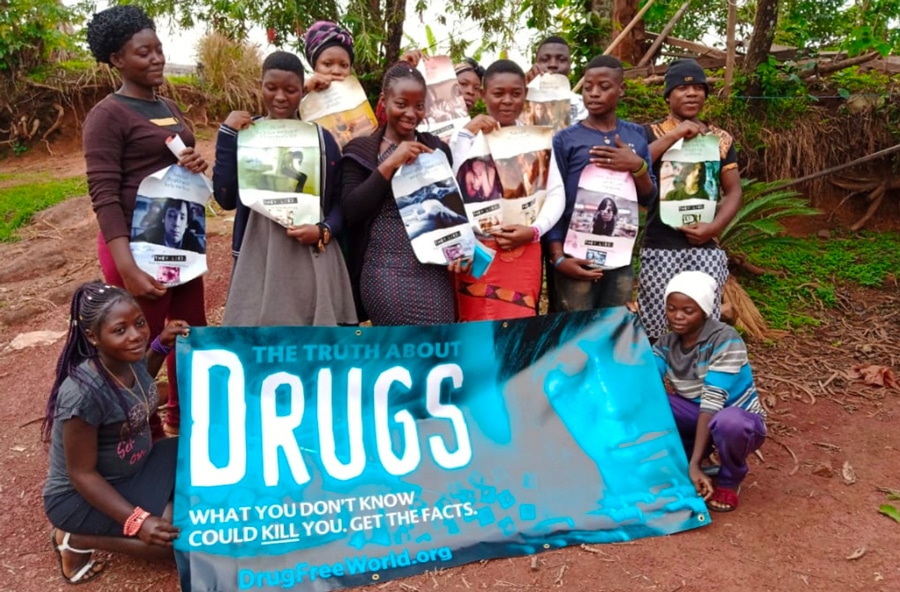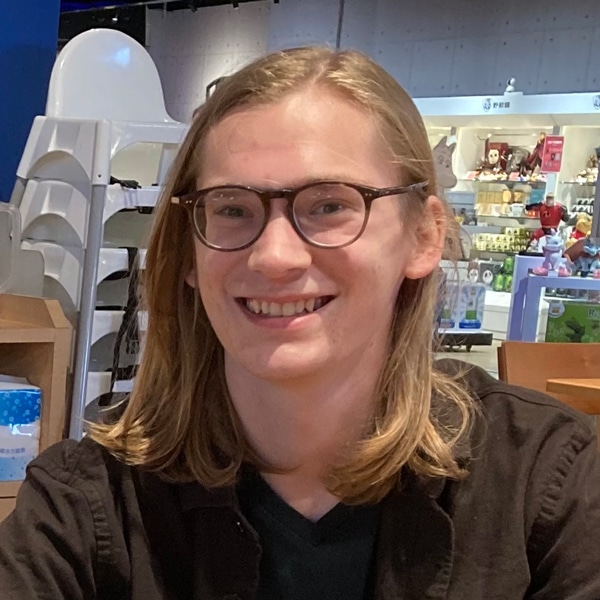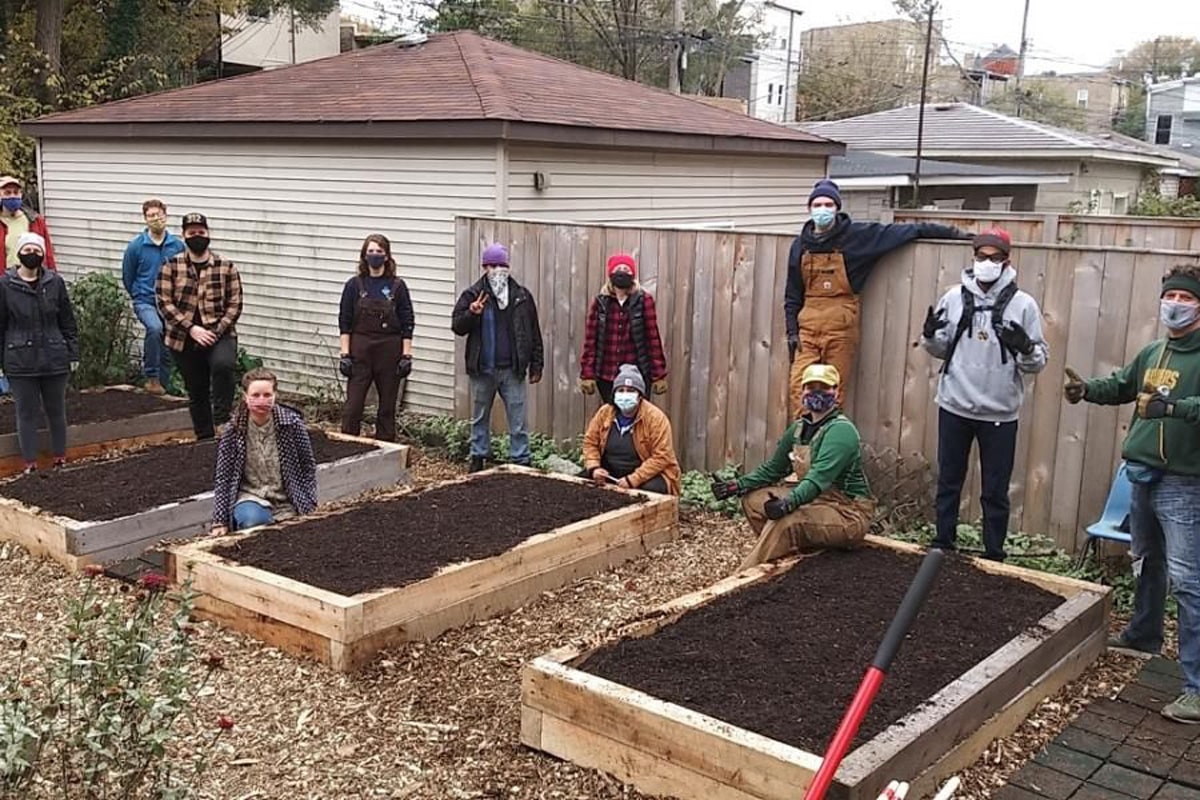Crescent Collective Calls for Religious Freedom and Understanding
By Yusuph Masanja, Co-Facilitator, Global Alumni Network
Goldin Global Fellow Mahdar Tahir from Malaysia and founder of the Crescent Collective contributed as a panelist to an online discussion and celebration about Religious Freedom. This online event brought together contributors from India, Sri Lanka, Philippines, and Malaysia to share wisdom and knowledge about how religious freedom promotes social harmony. The event was hosted on 28 April 2022 by American corners and was moderated by William Robertson, the U.S. Consulate General in Hyderabad, India.

At Crescent Collective, Mahdar works to guide Malaysian youth towards spiritual awareness and understanding by grounding moral values through talks, community projects, and volunteerism on arts and culture. Right after his participation in the Celebrating Religious Freedom event, I requested a brief interview with Mahdar to discuss his insights on the topic. We discussed tolerance, the role of religious leaders, and the problem of misunderstanding other people.

We started talking about tolerance where Mahdar argued for a more proactive approach in promoting freedom and harmony.
We must move beyond tolerance. I believe it is everybody’s duty to seek to understand others. We no longer live in villages without seeing other people. The world is global, and it is our job to promote understanding of different people and cultures. Even the Quran has a commandment about understanding each other. We would not need to know each other if we were the same!

In the face of today’s ongoing conflicts, Mahdar highlights the role of religious leaders in promoting peace. Their influence from spiritual teachings is a powerful force for Peace because they can speak to the hearts of people.
“It is not about the mind, it is about the heart. How do you understand others and begin to appreciate them if you do not even understand yourself?

He insisted that religious leaders must teach the core ethical values of understanding one another. That way we can effectively advance social harmony. In Mahdar’s perspective, failing to understand each other is evil, and the best way out of that is through complementing each other.

In this brief phone interview, Mahdar summed up his thoughts by reminding us that religion is a very powerful tool which can be used for good or for bad. And that the lack of understanding one’s own religious values is often a source of conflict.
Lack of religious freedom does not imply different religions fight against each other, but rather a tendency where certain individuals with evil motives use religions to divide people, exacerbate conflicts, and therefore limit freedom.
In a different but relevant update, this year’s Ramadan saw Mahdar working single handedly to collect food from Ramadan food bazaar and distribute it to those who needed it most. He sought to understand how the problem of food wastage during Ramadan could be solved. After walking and talking with community members to understand their concerns, he quickly took it up for himself to organize food that could otherwise be trashed as excess by vendors and delivered it to people who appreciated it!

He saw the value in understanding the predicament of local businesses in Malaysia with regards to freely distributing the food themselves which helped him realize a simple yet effective solution. His endeavor during this year’s Ramadhan reduced food wastage, created awareness and reminded everyone that the spirit of Ramadhan is to reduce consumption rather than increase them. “Reduced consumption will lead to zero waste.”
Peace Flowers Bloom in Chicago
By Zeki Salah, Facilitator, Mutual Aid Collaborative
On Sunday May 1st and Friday May 6th, a group of Chicago Peace Fellows supplied 300 Mother's Day bouquets to mothers who have lost their children to violence in Chicago. Now in its third year, the Peace Flowers campaign was first launched in 2020, when over $5,000 were raised to deliver flowers to grieving mothers.

The Peace Flowers Campaign was first created by the Chicago Peace Fellows Mutual Aid Collaborative, a group of 60 Black and Brown leaders and committed allies who live and work in the communities they serve on the South and West sides. The project was developed by the Mutual Aid Collaborative with the twin goals of bringing comfort to mothers who had lost their children to gun violence and to raise funds for peace building projects in Chicago to prevent these tragedies in the future.

The flowers were obtained and distributed by the Greening Collective, a project formed under the Mutual Aid Collaborative. Peace Fellows from a range of communities across Chicago are involved in the Greening Collective. Their joint efforts supported the project, Peace Fellows involved include: Annamaria Leon of Homan Grown, L3C, Reshorna Fitzpatrick of the Historic Stone Temple, Pamela Montgomery-Bosley of Purpose Over Pain, and Bertha Purnell of Mothers on a Mission 28.
The Peace Flowers campaign was a collaborative effort that showcased the impact of having community-based organizations from across Chicago pool resources and ideas. Three organizations with ties to the Mutual Aid Collaborative partnered to deliver the flowers to mothers in their network: Purpose Over Pain, Mothers On a Mission 28, and Stone Temple Baptist Church. The collaborative nature of the project not only helped with finding funding and flowers, but also connected these resources to a community of mothers who had lost their children.

300 bouquets were distributed over the course of two days by the Peace Fellows. On May 1st, 150 bouquets were brought to Stone Temple Baptist Church and Mothers on a Mission 28 to be delivered to mothers across the South Side. Bouquets were also delivered to Purpose Over Pain on May 6th for their annual Mother’s Day Spa Day.

Pamela Bosley, Co-founder of Purpose Over Pain, connects mothers to build a community of support and has been involved in the Peace Flowers project for the last three years:
“Mother's Day is a very difficult day for mothers who lost their children to violence, but a simple beautiful bouquet of flowers brings gentle smiles to moms, helping them push through this painful day.”
Bittersweet emotions characterized the Peace Flowers campaign as mothers faced grief alongside a supportive community. Despite ongoing concerns surrounding violence, the work of community-based organizations on projects like the Peace Flowers campaign makes Chicago a more peaceful and beautiful place to live. Through supporting these grassroots organizations with connections and funding, the Peace Fellows Mutual Aid Collaborative has had a sustainable social impact.
Building Safer Communities with the Chicagoland Vaccine Partnership
By Zeki Salah, Mutual Aid Collaborative Facilitator
Goldin Institute Peace Fellow, Annette Kelly, is helping host a series of workshops on Violence Prevention through her work with the Chicagoland Vaccine Partnership (CVP). Annette is the founder of FOUS Youth Development Services and was connected to the CVP through a funder of her organization. The CVP work focuses on sharing quality information about COVID vaccination in the communities hardest hit by COVID by mobilizing community leaders, educating community members and elevating multi-sector collaborations.

The CVP launched a learning community platform called the Learning Community in June 2021 that offered a unique virtual space for over 600 contact tracers, resource navigators, and concerned community members. In this space, community members could support each other in doing outreach about the COVID-19 vaccines and having open dialogue about health inequities and community organizing more broadly. This work was expanded by the CVP with the founding of the Learning Community Fellows, 11 members of the Learning Community that were hired to expand the outreach of the Learning Community and assist in curriculum development. Annette was selected as a Learning Community Fellow in October of 2021.

Prior to becoming a Learning Community Fellow, Annette had 15 years of experience running school based mentoring and violence prevention programs in the West Pullman community through her work with FOUS Youth Development Services. Through her work with the CVP, Annette is expanding her organization’s community impact by addressing the public health concerns regarding both COVID-19 and violence and their disproportionate effects on communities of color.
The goal of CVP’s Violence Prevention series is to invite the CVP Learning Community participants to see gun violence through the public health lens. The series aims to protect and improve the health of people and their communities and shows how community partnerships can address these issues. Two events have already been held, focusing on multi-sector collaborations and crime reporting and data. In the first event, Vaughn Bryant and Jesus Salazar of Metropolitan Family Services shared a network of community organizations that practice trauma-informed care and restorative justice practices. In the second event, Kimberley Smith of the University of Chicago Crime Lab showed how data about gun violence could be used to redirect resources to target populations most affected by that violence. Both events drew strong responses from the participants and provided a space for community dialogue and opportunities for collaboration.
The CVP’s Violence Prevention series will include two more workshops on violence intervention strategies and the impact of block clubs. The first of these events, Giving Hope: Innovative Violence Intervention Strategies, will occur on May 4th. It will aim to address the collective trauma of the COVID-19 pandemic by linking communities to trauma-informed mental health resources. The second event, Word on the Block: A Conversation About the Impact of Block Clubs, will be held on May 11th. This event will bring in people working with local Chicagoland Block Clubs to learn from them and provide space for community dialogue. Both events will continue the Violence Prevention series’ theme of illuminating how both violence and the COVID-19 pandemic affect public health on a broad and overarching level, while providing solutions that are community based and hyper-local.
Chicago and Cape Town Collaboration helps Capture History
By Reverend Berry Behr, 2021 Global Fellow, South Africa
A collaboration between two DePaul University students and the Cape Town Interfaith Initiative (CTII) has yielded a rare treasure – funding for the recording of an important personal account from an interfaith stalwart as part of our efforts to capture an oral history of the interfaith movement in South Africa.

As part of the DePaul students Intro to Non-Profit Management course at DePaul University with Professor John Zeigler, these students were inspired to volunteer to support this project across the globe when they heard about CTII’s Oral History Project. The students asked how they could help, and learned that each oral history recording costs in the region of USD500. So they immediately set to work, creating a GoFundMe campaign and reaching out to their friends and family.
Within just a couple of weeks, DePaul students Jenna Dahbur and Reese Elledge had raised enough to fund a recording for the archives of the significant interfaith work that contains many lessons of harmony, understanding and collaboration between diverse religious leaders in Cape Town.
"These oral history testimonies capture the interfaith efforts to end apartheid from those leaders on the front lines. We can preserve their stories that teach us so much about ending regimes of discrimination and the healing of communities from the wounds of separation."

In a beautiful twist of destiny, the funds will be used to record the story of Imam Rashied Omar who not only lectures at Notre Dame in the US and therefore contributes to the global body of knowledge on interfaith engagement, but is also a long-time friend of the Goldin Institute and an associate of Professor Ziegler who facilitated the collaboration between the students and CTII.
CTII looks forward to further collaboration with DePaul University students and is extremely grateful for their significant contribution.
LOV Day Hosted by Ladies of Virtue, Chicago
By Cree Noble, Team Coordinator
On Saturday, February 5th, and Saturday, February 12th, the Ladies of Virtue hosted their annual LOV Day Celebration as an expression of their mission “to instill purpose, passion, and perseverance in girls, ages 9 to 18, while preparing them for college, careers and to become change agents in their communities". Ladies of Virtue is a Chicago-based non-profit founded by Chicago Peace Fellow Jamila Trimuel in 2011 with the goal of becoming the premier mentoring and leadership training organization for Black girls in the world.

LOV matches their participants with mentors and prepare them for leadership through our culturally relevant character building, career readiness and civic engagement curriculum. The team at Ladies of Virtue provides project management, collaboration and communication training via their two to four-month project experiences to empower girls to lead in the modern workforce. After graduating from high school, with successful completion of LOV's leadership program, participants are mentored and supported for six additional years as LOV 4 Life alumni.

LOV Day was birthed because “many Black girls feel that their concerns go mostly unaddressed and overlooked. Research confirms what our girls have been telling us all along. Due to stereotypes, a 2017 Georgetown Law Study showed that adults believe black girls ages 5-19 need less nurturing, protection, support, and comfort than their peers of the same age".
"We know that this perception is not reality. We want Black girls and young women to know that they are seen, heard, and loved." - Jamila Trimuel, Chicago Peace Fellow

This unfortunate reality mixed with a couple of years into the pandemic, LOV Day was more important than ever before. Since Black girls are oftentimes seen as older and less nurtured than their peers, many Black girls experience higher rates of detention and suspension than most. With the pandemic, more Black girls are reporting they feel depressed and isolated. Founder of Ladies of Virtue, Jamila Trimuel, expressed the importance of “LOV Day is to show love to our Black girls!”

The love that the Ladies of Virtue showed to the girls for this LOV Day started on February 5th with a pamper party. At the pamper party, girls came together to play games, receive manicures, masks, and overall receive a self-care day to show their appreciation to the ladies. The second gift the Ladies of Virtue created for girls was 350 LOV boxes that they would pass out to girls across the South Side of the city.

These boxes included Black History Facts, teddy bears, hair care products, and PPE. This event was sponsored by the Goldin Institute - Mutual Aid Collaborative. In addition, product sponsors included: University of Chicago, Mielle Organics, Renee Ramore, Ferrara, and Ms. P’s Gluten Free!

Jamila loves the impact LOV Day has on girls who are not a part of the Ladies of Virtue mentorship program. One of the current mentees of the program found out about Ladies of Virtue when she received a LOV Day box last year. After receiving the box she wanted to join the program.

Ladies of Virtue is currently in the middle of programming for their mentees. Upcoming events are the College Expo which will take place on April 2nd, a community service event with mentees on April 16th, and their Juneteenth event. Ladies of Virtue is also accepting donations for upcoming graduates of 8th grade and 12th grade to help them be prepared for high school and college. Lastly, they are seeking mentors! For more information check out their website at https://www.lovchicago.org/ .
Collective Campaign Supports Grassroots Leaders in 19 Countries
By Yusuph Masanja, Co-Facilitator, Global Alumni Network
In December 2021, a new cohort of 24 grassroots leaders graduated from an 18-week community based leadership course called GATHER. Designed and implemented by the Goldin Institute, the GATHER Platform engages people who want to build on the talents of their neighbors and the assets of their communities to make real and lasting changes.
To share their wisdom and what they learned from the program, Fellows created a joint fundraising campaign to raise money that will support their continued social change projects in their countries. The campaign successfully raised 12,000 USD through online and offline donations.
“One of the key aspects of the GATHER program is to develop a global community of practice where grassroots leaders partner to promote community driven social change. Seeing such a partnership already happening, as Fellows collaborated to make a strong fundraising campaign, was so heartening and uplifting” — Yusuph Masanja, Co-facilitator, Global Alumni Network
On behalf of all Fellows, we take this opportunity to thank everyone who donated to this collective campaign. Here are some updates from the Fellows on your contributions are supporting grassroots solutions to global challenges:










Alumni are also extending a special thank you to the Goldin Institute board for matching all the donations!
To continue supporting the work of Goldin Fellows across the word, please visit our donation page to learn more or get in touch with me at yusuph@goldininstitute.org.
Global Fellows from Cameroon and the UK on a mission to help youth plan their future
By Mathias Ngong Njoya, Global Fellow from Cameroon
Personally, I have been unsuccessful in achieving new years’ resolutions! I also came to realize that many other young professionals are faced with a similar issue. So, I decided to come up with a biannual workshop that would help train and guide youth on professional development planning. We call it the Blueprint Workshop.

I teamed up with Dr. Gopal from the UK (a peer who I met during the 2021 Goldin Fellows Program) to join hands with my remote team members from Nigeria and Ghana in launching the biannual blueprint workshop. This two-day workshop took place from Jan 29 to 30th 2022 and brought together 30 youth from 15 countries in Africa and Asia. The second workshop of the year will be taking place in July 2022. The key objective for this first workshop was to invite young professionals to start the New Year with a clear set of achievable goals and provide them with goal-setting skills.
We had six speakers providing coaching on a range of topics such as the SWOT analysis (Strength, weakness, opportunities, and threats), effective goal setting, growth mindset, time management, overcoming procrastination, and development planning. We also shared templates that ga ve guidance to participants in implementing milestones which are key to achieving their goals. We have planned to pair all participants with accountability partners who will check in with them periodically. We are going to meet again with all the participants in the middle of the year to assess their progress together and offer additional support where required.
Participants shared positive feedback at the end of this two-day workshop with some requesting for the Blueprint workshop to be held quarterly so that they can track, learn and course-correct their plans in more regular periods.
"I used to think that SWOT is a tool only used by companies to devise strategies and assess markets. Through the workshop, I learned how to utilize SWOT for my own personal planning and strength assessment."
We hope to make the blueprint workshop available to more youth. It is useful to help them analyze factors outside their control while making plans. And tools such as time management can really help everyone become productive rather than simply being active. If you do not know how to prioritize, you will often not be productive.
Reflecting on the success of the workshop, I think it is crucial that I explore ways to partner with more Goldin Institute Fellows. Working with Dr. Gopal was great, and I now feel like I know him way better because we spent time planning and working together for the success of this workshop.
Solidarity and Survival During COVID
By Yusuph Masanja, Co-Facilitator, Global Alumni Network
The Chicago Peace Fellows have tirelessly continued to find ways in helping families survive COVID. In the stories below, our Fellows, Jamila Trimuel, Dawn Hodges, and David Gonzalez are making a huge difference in South Side Chicago.
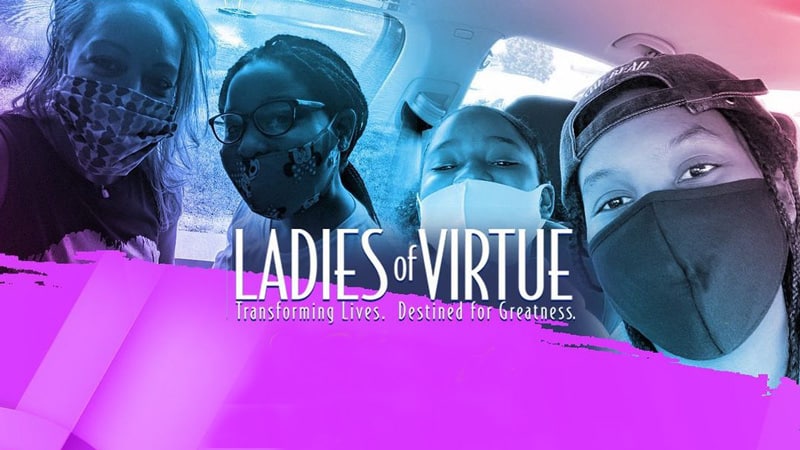
Chicago Peace Fellow, Jamila Trimuel, is a founder of Ladies of Virtue, an award-winning mentoring and leadership program that has empowered over 1,000 girls, ages 9 to 18, to become confident and purpose-driven leaders.
In 2020, Ladies of Virtue served the community with the support needed to survive the pandemic. They served 4,000 meals to 1,220 people in the community, they gave out school supplies, financial stipends, PPE and laptops for families.
We are so proud that we are not only serving the 200 girls we are serving this year but also over 1,000 community members. - Jamila Trimuel, Founder of Ladies of Virtue
This summer, Ladies of Virtue held their very first summer STEM program called “STEMuTiful". This program is a virtual summer experience promoting self-love, confidence, and beauty while increasing exposure to black women executives in the STEM and beauty industry. As a result, 84 percent of girls involved said the program increased their confidence and 100 percent of participants said that they learned more about STEM careers as a result of the program.
Jamila’s motivation to start Ladies of Virtue emanated from her own personal experience while in high school. She noticed some of the students, including her friends, were not planning for life after school. Having learned from constant encouragement from her parents to pursue her passion, Jamila knew that having positive role models in life to push you towards your dreams can really make a difference. So, while in college, she decided to become a mentor to help those students, to kind of push them along, and be a listening ear if needed. As she got older, Jamila realized that mentoring youth was her true passion, thus, she started Ladies of Virtue.
Go social with Ladies of Virtue this month to follow celebrations of the National Mentoring Month throughout January using #LOVChicago on Instagram, Facebook, and Twitter.
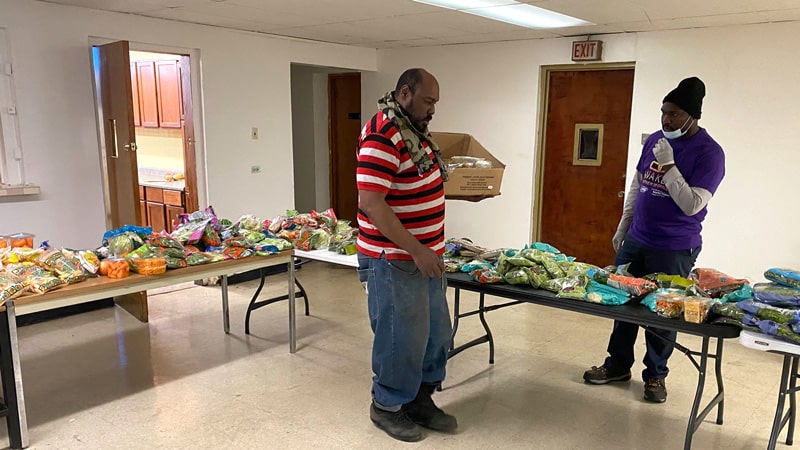
Dawn Hodges, Chicago Peace Fellow and the Executive Director at Imani Community Development Corporation is busy gathering and distributing as many resources as possible to neighbors in need. For over 40 years, the Imani community has been a pillar in the neighborhood, primarily focusing on mentoring, out-of-school programming, and food distribution.
Whatever is needed by the community we try to gather, that’s not our usual model but that’s what we do right now. We try to be of service to our community as much as we can. - Dawn Hodges
Dawn and her team provide monthly food distributions serving 200 families. COVID complicated their operations but they never stopped. Dawn and her team didn't miss a month in 2020, even with the pandemic. "We just kept going,” Dawn says.
As Dawn continues to gather and distribute resources, she is requesting any help that could be given to further support communities in need. More importantly, Dawn requests more and more prayers from us. The following quote from Marianne Williamson inspires Dawn and she shares it often with her peers:
Our deepest fear is not that we are weak. Our deepest fear is that we are powerful beyond measure. It is our light, not our darkness that most frightens us. We ask ourselves, who am I to be brilliant, gorgeous, talented, fabulous? Actually, who are you not to be?
Focus areas like, after school summer programs and mentorship for young men, are hugely affected. They recently conducted a virtual summer camp and continue to engage kids virtually, but it is challenging. Dawn says, “Now we do check-ins but it’s not the same, getting kids to focus on a call is a big problem.”
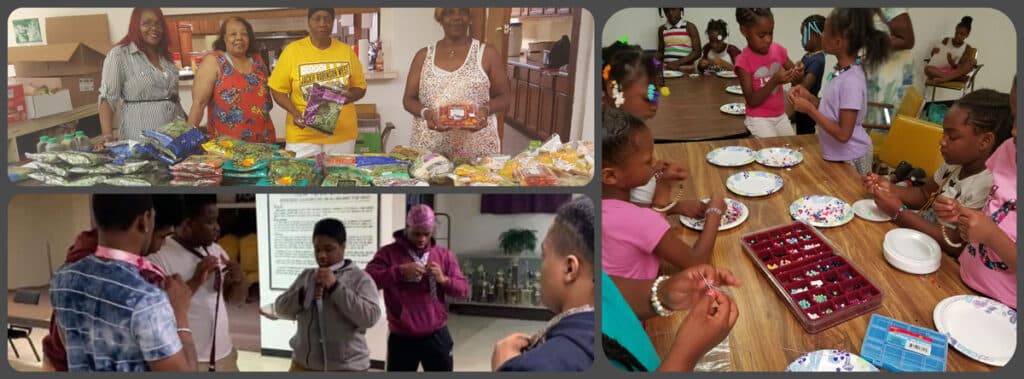
Chicago Peace Fellow, David Hommy Gonzalez, is the Executive director of Port Ministries, a non-profit in Chicago offering free clinic services, after school and food distribution programs. They also run art programs and the adult education program called the People's School.
David and his team had no idea how to get sandwiches donated anymore when the pandemic hit. They reached out to individuals and so many were willing to make sandwiches in their houses and leave it at their doors for a driver to pick up and donate. David found this to be an interesting way to allow people to volunteer from a place they are comfortable, their houses!
Our food provision had to adjust during the pandemic. We had to partner more. - David Gonzalez
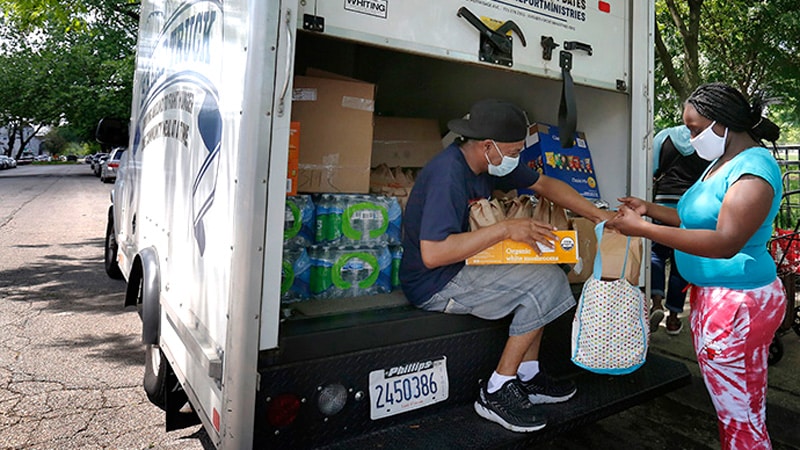
David owes the Port Ministries vision to his mother. He remembers being very poor in his hometown. His mother went hungry many times, buying food only for David but failing to provide for herself.
Now that I am educated and have a good position. It’s my responsibility to use that privilege to give our Mamas all the tools possible. I created that free clinic because I remember my medical struggle, I created the bread truck because I remember going hungry—you never forget what going hungry feels like. You never forget how it feels like to be homeless. - David Gonzalez
David manages expectations by surprising people with food during distribution. He is trying to avoid disappointment—in times when food is not available, but people still expect it to come. David says, “The one thing about hunger is that it comes back tomorrow, it is never fully solved. All we can do is keep throwing food at that problem and know that tomorrow it comes back. So, we spread out and go to different locations, it’s not like someone is surviving on us, we are trying to feed as many people as possible, and the moment they do survive on us there is a different program for that. Because that needs more attention.”
With his nonprofit, David is now collaborating with other Goldin Fellows in various programs, fitting in the puzzle pieces to really catch all the community needs. Using their truck, they assist in delivering food to elderly people in need. “If someone needs our help to deliver food, we got you,” David says.
Generating food, beauty and safety for neighbors in Chicago
By Yusuph Masanja, Co-Facilitator, Global Alumni Network
Goldin Global Fellow from Chicago, Robin Cline, serves as Assistant Director of NeighborSpace, the only nonprofit land trust in Chicago that preserves and sustains gardens on behalf of dedicated community groups. NeighborSpace has helped neighbors and community groups protect over 120 outdoor sites, transforming them into places where people gather to play, to grow food together, and to organize around issues in their neighborhood.
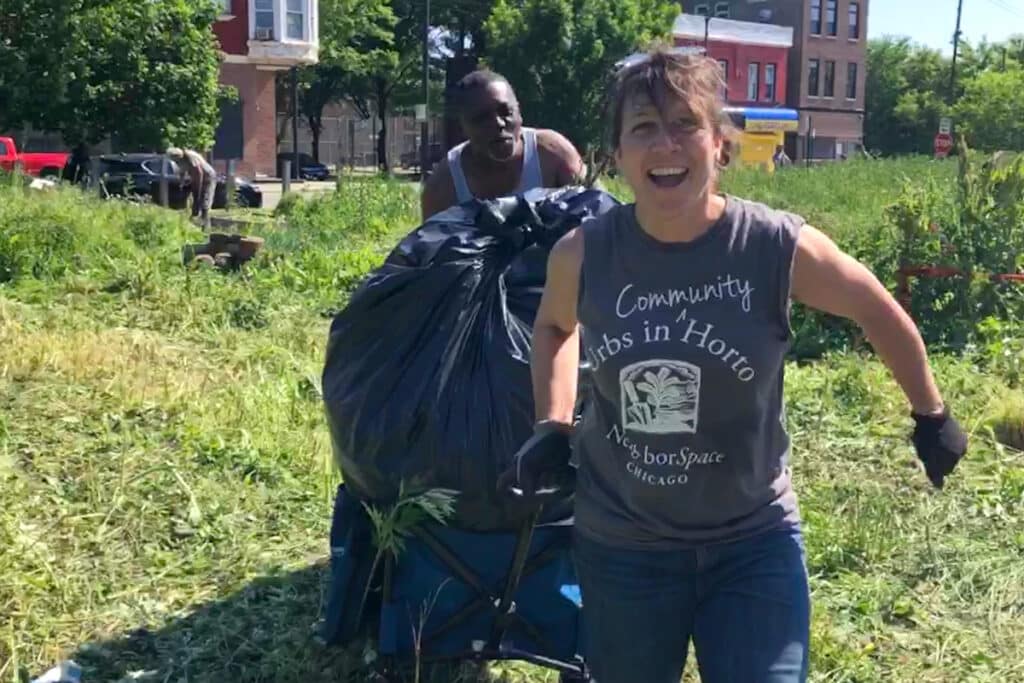
NeighborSpace continues to help community groups identify outdoor sites that can be turned into community garden spaces. They partner with early community organizations, early childhood teachers, seniors, and families in turning potential unused sites into gardens and creative gathering spaces. Especially now in the time of COVID, these outdoor spaces are more and more used as places for free haircuts, food distributions, COVID tests, and community meetings.
NeighborSpace continually works to support more growing and gathering space, and you can help with this New Year’s goal of adding 100 garden beds to NeighborSpace sites across Chicago, by visiting this Crowdfunding page to help NeighborSpace reach this goal before the 2021 growing season.
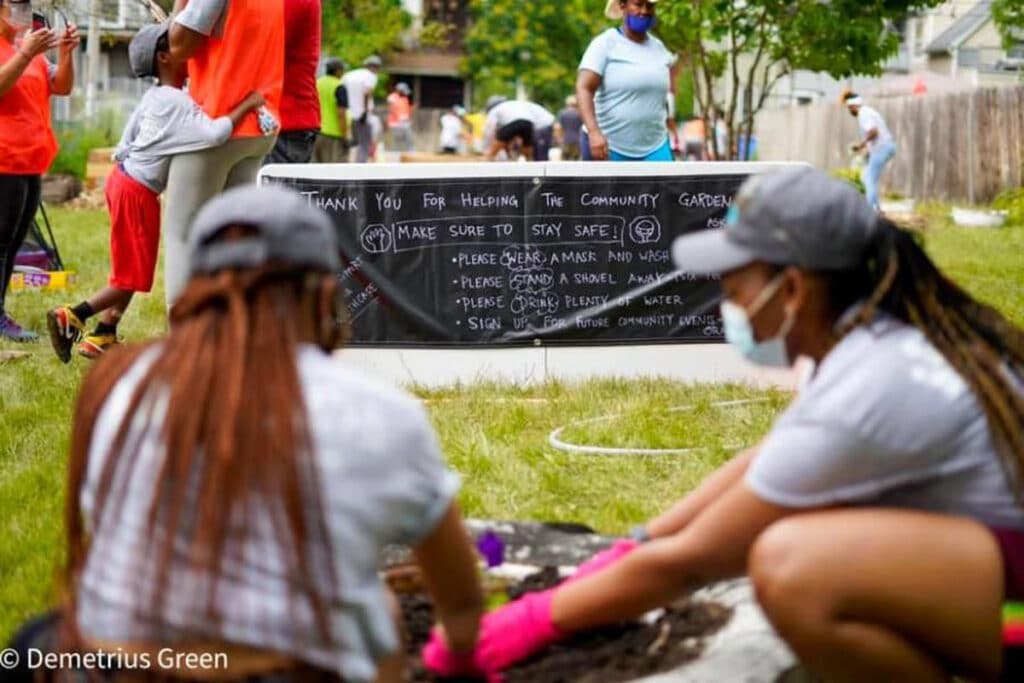
For Robin, the motivation to dive into this work comes from the goal to encourage urban people to reconnect with nature, themselves, and their community. Robin believes that if you set the right conditions for people to understand a series of processes, like that of a plant ––from seeds to fruits––it helps them understand the importance of how connected we are.
"How can we create opportunities for people to have physical connections to shared public spaces that then prompt them to have in-person connections with their neighbors?"
/Robin has recently graduated from the Visual Collaboration course which was offered by the Bigger Picture Academy. Having been inspired by this collaboration tool, she is considering applying it to support processes by which the garden leaders conduct their community building vision. Robin is mobilizing resources to provide these leaders with access to computers and the Mural application in order to learn and start using Visual Collaboration methods.
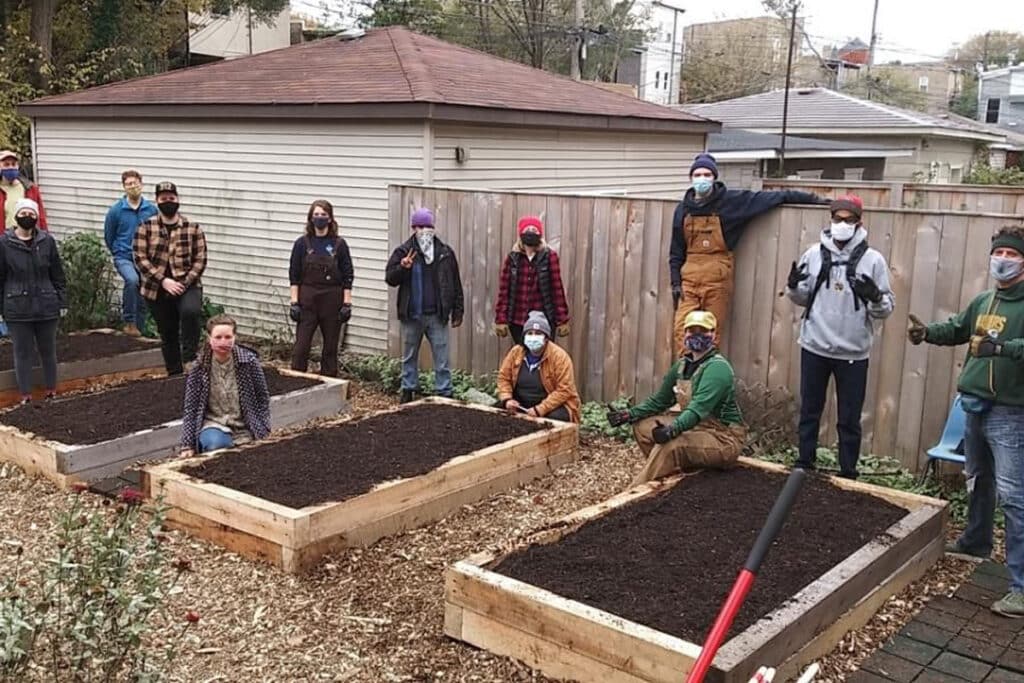
Furthermore, Robin finds inspiration from the stories of Goldin Global Fellows. The stories motivate her to keep up the good work despite challenges faced from time to time.
"Hearing other people’s stories of salvation and struggle fuels the work I am doing. We are doing non-profit work that sometimes feels invisible."
Robin adds: "The sharing of stories is so 're-storying' which is so restorative, I feel like that's an important part of the Goldin Global Fellows connection- to support each other in serving others."
Every One of Us is Better Than Any One of Us
By Yusuph Masanja, Co-Facilitator, Global Alumni Network
We want to teach young people how to be productive, we don’t just give them jobs! We ensure they can keep the jobs and grow to creating their own jobs
Raymond Richard, Goldin Global Fellow
Raymond emerged from struggles of homelessness, criminal activities and substance abuse to become a mentor, activist, and public speaker. He works tirelessly to decrease neighborhood violence and contribute to a safe environment for children and families across the United States. Driven by the urge to help young men and women become productive members of society, Raymond founded Brothers Standing Together (BST) in 2009, a year later after being released from his sixth incarceration.
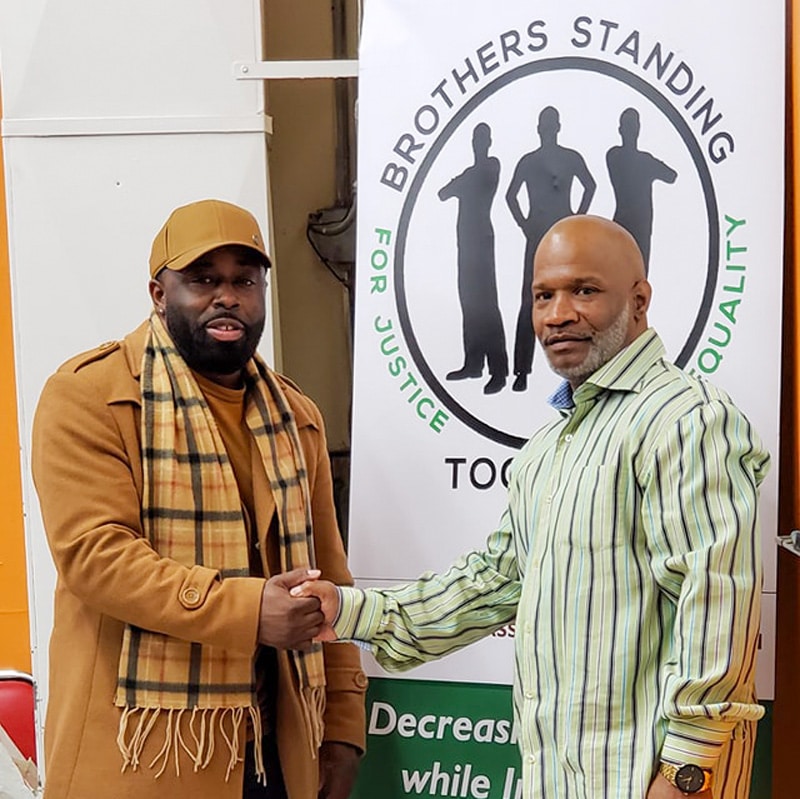
BST has empowered over 1,500 youth through different programs, including but not limited to, practical skills training such as carpentry, plumbing, welding, painting, bricklaying etc. Raymond provides lifelong traits that help youth find a purpose in life. BST programs also assist youth with obtaining Identity cards, birth certificates, license, housing, meals and employment.
“65% of young men in the city of Chicago don’t have IDs, every time they are stopped by police, they are labeled as John Does.” Raymond says.
BST is partnering with County jails to provide opportunity for community service work. At BST, Exemplary volunteers often get enlisted for available job opportunities. During the pandemic, it has become challenging for BST to reach youth, especially the homeless.
COVID has decimated our community outreach, I am often outside seeking job opportunities for our youth or speaking with youth because most of them are outside–you have to be grassroot to serve them better. It’s now difficult to reach out to those who are mostly likely to shoot or be shot, we try to keep communication open with caregivers and parents through emails.
With 15 staff, BST tries everything to reach more youth, but more help is needed. Ray shared, “With all the good help we provide, we don’t even have the help that we need, and that’s our struggle. That’s why I created the Brothers Standing Together LLC program in order to help the nonprofit.”
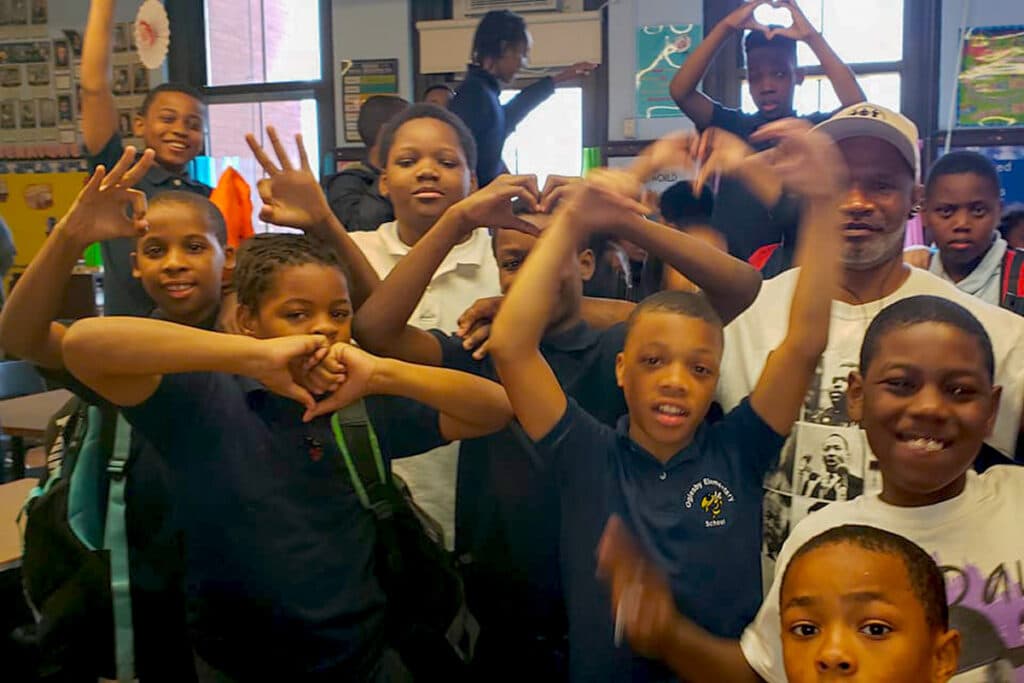
Raymond has been a strong advocate against the shootings of Tamir Rice, Mike Brown and Eric Garner. His advocacy work has been featured broadly on CNN and MSNBC media. Among other advocacy, he continues to lobby for a change of legislation affecting returning citizens, the term he advocates to be adapted for formerly incarcerated individuals, because the majority of them are now productive members of society like himself. To reiterate the puzzling question his mentor uses in advocacy, Raymond asks “Where do my wrong ends and my rights begin?"
Raymond calls on all Goldin Global Fellows to stay connected and united, because the struggle against violence is not only in America but worldwide. He would be happy to hear from any fellow interested in collaboration or needing any assistance that he can provide. He says “every one of us is better than any one of us” Brothers Stand Together needs us to keep them uplifted as they keep us uplifted.
